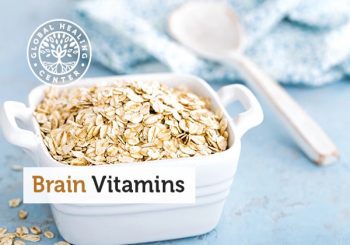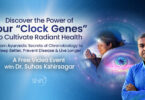Guest Writer for Wake Up World
You may have heard that taking extra vitamins can improve your memory, protect against Alzheimer’s disease, or help you ace that test. Are “brain vitamins” really a thing? In reality, a debate exists over whether vitamins can boost your brain health. You may see wild claims that one vitamin or another may make you smarter, wiser, or delay aging. Others say they do not actually improve your brain’s functioning and make you smarter but do support an already-healthy brain.
Can Vitamins Help Brain Health?
Throughout life, your brain continually creates new connections and repairs broken ones. Vitamins, minerals, and other nutrients, sometimes called nutraceuticals, support that process.[1, 2]
Yet many people don’t get enough of key vitamins and minerals that best support brain health. You may become low in a certain vitamin or mineral without realizing it. This can lead to low energy, brain fog, and memory loss. The stress of modern lifestyles can even deplete the vitamins and minerals you do consume.
You can’t have a thriving brain if you do not have these essential and important nutrients. In the end, vitamins and minerals may not make you smarter, but they can support a healthy brain, especially if your body is low in one — or more — of them.
The Best Vitamins and Minerals to Support Brain Health
All nutrients play a role in keeping us healthy, but some are specifically good for the brain. If you follow a healthy diet, it’s easy to get most of these nutrients through your food. However, many people do not have an ideal diet, full of colorful and diverse fruits, vegetables, grains, and healthy oils. If your diet falls short, supplementation becomes more important.
B Vitamins
All eight B vitamins are important for brain cell functioning and work best together. B vitamins are water-soluble, meaning your body uses them immediately and does not store them; your body excretes any excess.
B vitamins help produce key neurotransmitters: serotonin, dopamine, and GABA. Neurotransmitters are molecules that send messages throughout your brain and body.
While B-1 (thiamine), B-2 (riboflavin), and B-6 (pyridoxine) play a role in brain health, the most significant B vitamins for brain health are the following.
Vitamin B-12 (Cobalamin)
Not enough B-12 means not enough brain fuel.[3] Your brain is about two percent of your body weight but saps 20 percent of your entire body’s energy stores, and B-12 plays a crucial role in energy metabolism.
B-12 also removes toxins from the brain. Specifically, it helps remove homocysteine, an amino acid linked to brain shrinkage and other adverse health effects.[4] A diet high in meat can raise homocysteine levels which can damage delicate blood vessels in the brain and increase the risk of blood clots. Eating a plant-based diet, in general, helps to reduce clotting and inflammation within blood vessels.
Despite its importance, about 40 percent of the U.S. population has low B-12 levels.[5] This can lead to mental and emotional changes, such as memory loss and brain fog.
Best sources: You can only get vitamin B-12 in meat and dairy — although some strains of probiotic bacteria produce it. Vegetarians, vegans, older people, and those with conditions that prevent them from absorbing B-12 should take a supplement.
Vitamin B-9 (Folate)
Folate is the version of B-9 found naturally in foods, while folic acid is the same vitamin but made in a laboratory. B-9 plays an essential role in producing your brain’s neurotransmitters.
Too little folate can lead to neurological disorders and cognitive impairments. This applies to a developing fetus as well as adults. A deficiency in folic acid or folate has been linked not only to elevated homocysteine levels, but also to Alzheimer’s disease.[6] It is often a challenge to get enough B-9 from foods.
Best sources: You’ll find B-9 in green leafy vegetables, beans, asparagus, beets, and citrus fruit. For more ideas, view our folate-rich foods article.
Antioxidant Vitamins
Your brain needs a great deal of energy to do its job. With its delicate functioning, the brain is also prone to disease-causing oxidative stress.
When free radicals in your body damage cells, this is called oxidative stress. These free radicals get generated naturally, but more so when you are exposed to toxins and stress.
Vitamins E, C, and D are some of the body’s most important essential vitamins for your brain. They act as antioxidants, compounds that counteract the effects of cell-damaging free radicals.
Vitamin E
Vitamin E is exceptionally effective at counteracting free radicals. It supports the brain’s ability to adapt and grow new connections. It also boosts your immune system.[7]
Healthy people with diets rich in vitamin E may even be less likely to develop dementia, and it may slow the development of Alzheimer’s disease.[8] Yet ninety percent of Americans do not get the estimated average requirement!
Best sources: You can get vitamin E in hazelnuts, green leafy vegetables, asparagus, avocados, olives, spinach, and sunflower seeds.
Vitamin C
Vitamin C is a powerful antioxidant. Low levels of vitamin C in people has been linked to depression.
Vitamin C helps convert the neurotransmitter dopamine to norepinephrine. Norepinephrine affects executive function, which means focus, interest, intelligence, and mood.
Vitamin C deficiency is rare, but if you smoke or eat a lot more meat than plant foods, you might not get enough.[9]
Best sources: Vitamin C-rich foods include citrus fruits, tomatoes, broccoli, bell peppers, leafy greens, and berries — especially strawberries, raspberries, and cranberries.
Vitamin D
Vitamin D is a fat-soluble vitamin that plays a crucial role in protecting brain health and function. It supports a healthy mood and protects against declines in cognitive function.[10]
A clear example of the importance of this “sunshine vitamin” is the example of SAD — seasonal affective disorder. Many people get the blues during months of low sunlight when your body produces less vitamin D.
Global Healing Center’s Suntrex D3™ provides a superior plant-based source of vitamin D in an easy-to-take liquid formula.
Best sources: Your bare skin produces this vitamin from daily exposure to the sun, but you may need more during certain times of the year. Try shiitake and button mushrooms to help boost your intake of this vitamin. If you are vegetarian or vegan, you may need a supplement as most sources of vitamin D are not plant-based.
Minerals
Dietary minerals are chemical elements that your body needs to function. The following minerals are especially important to the brain:
Iron
Iron is a mineral that helps regulate the central nervous system, including the brain. Your body uses it for metabolic processes involving thought and behavior.
Iron insufficiency is widespread, particularly among women of child-bearing age, pregnant women, vegetarians, and vegans. Low iron levels can cause brain fog and even psychiatric symptoms.[11]
Best sources: Iron-rich plant-based foods include legumes such as white beans, lentils, and kidney beans, as well as oats and spinach. Sesame seeds and cashews are also high in iron. You can also buy iron supplements, but many are harsh on your system. Global Healing Center’s Iron Fuzion™ is a plant-based supplement that is gentle on your stomach.
Lithium
One mineral that shows promising results as a “brain booster” is lithium, an important trace mineral. While lithium is found in many foods, lithium orotate is an optimal form found in supplements. This combines lithium and orotic acid, the same substance that makes zinc orotate so effective.
Lithium orotate may increase the brain’s gray matter. In fact, it is one of the only things known to stimulate new brain cell growth other than exercise.[12] Consuming small servings of lithium orotate can powerfully increase proteins that maintain and repair brain’s cells.[12] It shows remarkable potential for lifting mood, memory, and cognitive function.
Best sources: Lithium is found at low levels in many foods, including lentils, garbanzo beans, mushrooms, cauliflower, brown rice, and coffee. If you take supplements, purchase them from a reputable supplier.
Nutraceuticals
Though they’re not vitamins, nutraceuticals are worth mentioning because some play a substantial role in cognitive function. The word simply means a component of food used for therapeutic purposes. Nutraceuticals that help brain health are called nootropics.
Omega-3 Fatty Acids
Omega-3s are the building blocks of your neurons and their cell membranes. Omega-3 fatty acids also help limit the number of beta-amyloid proteins that develop in your brain as you get older. Excess beta-amyloid protein in the brain is linked to Alzheimer’s disease and other neurodegenerative diseases.[13]
There are three main types of omega-3s: alpha-linolenic acid (ALA), eicosapentaenoic acid (EPA), and docosahexaenoic acid (DHA). You have to get ALA from food or supplements, but your body produces DHA and EPA (that’s not to say you can’t become low).
Most people don’t get enough omega-3s relative to omega-6 fatty acids, so getting them in your diet is important.[14, 15]
Best sources: Great sources of omega-3 fatty acids include olive oil, flax seeds, chia seeds, algae oil, walnuts, and kiwi fruit. Algae oil is one of few plant sources of EPA and DHA; the other plant sources mainly provide ALA. Avoid fish oil supplements if possible as they have a high likelihood of mercury contamination.
Probiotics
Probiotics are helpful microbes that support digestive health. Healthy gut bacteria play a key role in the two-way communication between your gut and your brain.[16]
The gut-brain axis is a well-documented phenomenon in science, though less well-known by the general public. Your gut produces up to 90 percent of the serotonin in the body! Bottom line: If you want a happy and healthy mind, make sure to nurture your gut biota.
Best sources: Get probiotics from fermented foods such as sauerkraut, kombucha, and coconut milk yogurt. Or look for a high-quality supplement like Global Healing Center’s Floratrex™, an advanced formula with 25 unique strains and 75 billion CFUs.
Tips on Boosting Brain Function
What you do to keep your heart and the rest of your body healthy is also good for your brain. The combination of these healthy lifestyle practices is more powerful than any of these actions alone.[17]
- Eat a plant-based diet full of veggies, fruits, gluten-free grains, and healthy oils.
- Avoid excessive sugar which atrophies the brain.
- Exercise regularly: it grows brain cells!
- Try nootropic herbs like Rhodiola rosea and ginseng.
- Do brain exercises, like puzzles, reading, or taking up a new hobby!
Points to Remember
Several vitamins, minerals, and nutraceuticals support brain health. Brain health includes your ability to remember, learn, concentrate, and maintain a clear, active mind.
No specific nutrient is a “brain vitamin” per se, and taking more vitamins will not necessarily boost your mental powers. Yet many people have low levels or are even deficient. In those cases, supplementation or eating more vitamin-rich foods can help.
Stress also depletes your body’s stores of vitamins and nutrients. Ensure you get enough of the vitamins your brain needs for best mental health.
The best vitamins for a healthy and happy brain include B-12, folate (B-9), the antioxidant vitamins E, C, and D, and the trace minerals iron and lithium, particularly lithium orotate. “Nutraceuticals” such as omega-3 fatty acids and probiotics are also important for top brain function. As long as you use as directed, vitamins and minerals do not typically have side effects in healthy individuals.
The best way to get these micronutrients is through your diet. Supplements are sometimes a good option, especially if your diet does not contain an array of brightly colored fruits and vegetables. Physical activity and brain exercises, such as doing crossword puzzles and reading, also improve your brain health.
Have you taken any vitamins or minerals to boost your brain health? We’d love to hear your experiences in the comments below!
Article sources:
- National Institute on Aging, National Institutes of Health, “What Is Brain Health?” web page. Accessed Dec. 10, 2018.
- Gómez-Pinilla, F. Brain foods: the effects of nutrients on brain function. Nat Rev Neurosci. 2008 Jul;9(7):568-578.
- Raichle M.E. Two views of brain function. Trends Cogn. Sci. 2010;14:180-190.
- Smith AD, et al. Homocysteine-Lowering by B vitamins slows the rate of accelerated brain atrophy in mild cognitive impairment: a randomized controlled trial.” PLoS ONE. 2010 Sep 8;5(9):e12244.
- McBride, J. B12 Deficiency May Be More Widespread Than Thought. United States Department of Agriculture website.
- Folate: Fact Sheet for Health Professionals. National Institutes of Health Office of Dietary Supplements Website. Updated 4 Oct 2018. Accessed 18 Apr 2019.
- Vitamin E: Fact Sheet for Health Professionals. National Institutes of Health Office of Dietary Supplements Website. Updated 17 Aug 2018. Accessed 18 Apr 2019.
- Gestuvoa MK, Hung WW. Common dietary supplements for cognitive health. Again Health. 2012 Feb;8(1):89-97.
- Vitamin C: Fact Sheet for Health Professionals. National Institutes of Health Office of Dietary Supplements Website. Updated 18 Sept 2018. Accessed 18 Apr 2019.
- Vitamin D: Fact Sheet for Health Professionals. National Institutes of Health Office of Dietary Supplements Website. Updated 9 Nov 2018. Accessed 14 May 2019.
- Beard J. Iron deficiency alters brain development and functioning. J. Nutr. 2003 May;133(5):1468S-1472S.
- Marshall TM. Lithium as a nutrient. J Am Physicians Surgeons. 2015; 20(4):104-109.
- What Happens to the Brain in Alzheimer’s Disease? National Institute on Aging Website. Accessed 18 Apr 2019.
- Simopoulos AP. The importance of the ratio of omega 6/omega 3 essential fatty acids. Biomed Pharmacother. 2002 Oct;56(8):365-379.
- Fenton JI, et al. Immunomodulation by dietary long chain omega-3 fatty acids and the potential for adverse health outcomes. Prostag Leukotr Ess. 2103 Nov-Dec;89(6):379-390.
- 4 Fast Facts About the Gut-Brain Connection. National Center for Complementary and Integrative Health Website. Updated 24 Sept 2017. Accessed 18 Apr 2019.
- National Institute on Aging, “What Is Brain Health?” Accessed 10 Dec 2018.
Originally published at Global Healing Center and reproduced here with permission.
Recommended articles by Dr. Edward Group:
- 13 Ways to Improve Memory Naturally
- Mental Clarity: 9 Solutions That Work
- Natural Appetite Suppressants: The Best Ways to Eat Less and Lose Weight
- Everything You Need to Know About Hemp vs. CBD
- CoQ10 Benefits: A Powerful Energizing Antioxidant for Health and Vitality
- The Healing Power of a Gut Cleanse: 6-Day Detox
- Hormonal Imbalance in Women: Top Causes and Home Remedies
- The Top 10 Detox Herbs
- 14 Foods that Cleanse the Liver
- Top 5 Foods for the Pineal Gland
About the author:
Dr. Edward F. Group III (DC, ND, DACBN, DCBCN, DABFM) founded Global Healing Center in 1998 with the goal of providing the highest quality natural health information and products. He is world-renowned for his research on the root cause of disease. Under his leadership, Global Healing Center earned recognition as one of the largest natural and organic health resources in the world. Dr. Group is a veteran of the United States Army and has attended both Harvard and MIT business schools. He is a best-selling author and a frequent guest on radio and television programs, documentary films, and in major publications.
Dr. Group centers his philosophy around the understanding that the root cause of disease stems from the accumulation of toxins in the body and is exacerbated by daily exposure to a toxic living environment. He believes it is his personal mission to teach and promote philosophies that produce good health, a clean environment, and positive thinking. This, he believes, can restore happiness and love to the world.
For more, please visit Global Healing Center.

If you've found value in our articles, we invite you to support the release of our brand-new book, "Gratitude Practices for Kids: A Practical Guide for Adults to Instill a Spirit of Appreciation and Positivity in the Next Generation."
"Gratitude Practices for Kids" brings together over 25 innovative and accessible practices designed to enhance gratitude in everyday life. This comprehensive guide is backed by 17 scientific studies, ensuring each concept is grounded in research, underscoring our commitment to nurturing growth, emotional intelligence, and positive interactions between adults and children.
We encourage you to opt for the paperback version to celebrate this new release. Dive into its fresh pages away from digital distractions, allowing you to immerse yourself in the transformative practices it offers.
Over recent years, Wake Up World has faced significant online censorship, which has impacted our financial ability to operate. Moving into book publishing represents a strategic step to secure the ongoing funds needed to continue our mission. By purchasing Gratitude for Kids, you help us keep our content free and accessible to everyone, avoiding needing a paywall. With over 8,500 articles published in the last 13 years, we remain dedicated to keeping our valuable content open to all.









